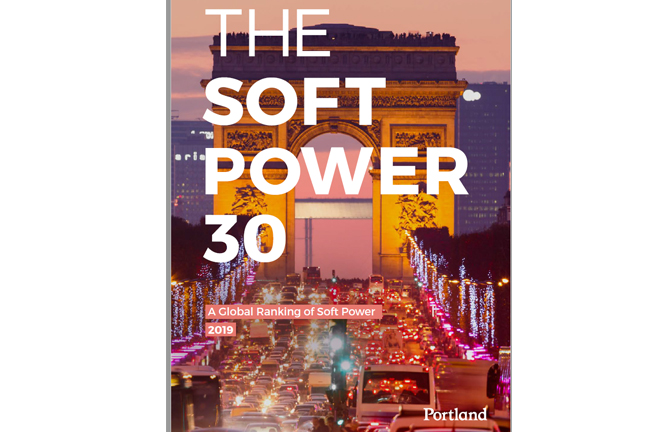China’s soft power assets show strength and resilience

The study assesses 30 nations’ soft power using both subjective and objective data Photo: PORTLAND
Despite the complicated external environment, China maintained its ranking of 27th in the 2019 Soft Power 30 report, which was recently released by the UK public relations consultancy Portland Communications and the USC Center on Public Diplomacy in the US.
Using both subjective and objective data to measure the soft power resources of 30 countries, the study assesses the relative strengths and weaknesses of each nation’s soft power, ranking countries according to potential influence.
In the report, James Crabtree, an associate professor from the Lee Kuan Yew School of Public Policy at the National University of Singapore, analyzed the impact of the Belt and Road (B&R) initiative on China’s soft power building, noting that for the initiative to gain international support and play an active role in building the country’s soft power, changes need to be made to make its model more open, transparent and trustworthy.
In this regard, Chen Long, dean of the School of Communication at Soochow University, said that Crabtree has pointed out the key to the enhancement of China’s soft power. In recent years, China has invested huge amounts of human, material and financial resources in the field of external communications, but it has had a limited effect. Why?
The current popularity of people like Li Ziqi—a Chinese food and rural-life blogger—in the Western cyberspace, reminds us that we must spread common voices that can strike a chord, and we must win the emotional recognition of international people with a people-oriented spirit, Chen said. At present, to promote the concept of the community of shared future for mankind and bring it into the hearts and minds of the whole world, more Li Ziqi-style narratives are needed. The idea of the community of shared future for mankind should be introduced to Western people, so that they can feel the sincerity and credibility of the idea. We need to win the recognition of Western people in an innovative, lively and sensible way, thereby enhancing the country’s soft power.
The report emphasizes that the current level of soft power in Asian countries is better than that in 2015, and the current economic and geopolitical trends promise the increasing soft power of Asian countries to be a long-term trend.
European countries account for the first four positions in the top five, namely France, Britain, Germany and Sweden. France replaced Britain to take the lead, and the United States fell to fifth place. The report believes that the decline of US soft power is mainly due to the negative impact brought by the diplomatic framework surrounding “America First.”
Huang Maoxing, dean of the School of Economics at Fujian Normal University, said that this soft power ranking uses a combination of objective and subjective indicators, which differs from some Western evaluation agencies’ purely subjective survey evaluation methods. This has good reference value for truly reflecting a country’s soft power.
Looking at the evaluation results, the strong performance of European countries is notable, which is generally close to reality. Although the United States’ economic and military strength is second to none in the world, its soft power has been damaged in recent years by its abnormal behavior in international affairs and abnormal national credibility. Asian countries including China are economically and socially stable on the whole. Their right to have a say in the global governance system is constantly rising, showing an ever-increasing soft power.
edited by JIANG HONG

 PRINT
PRINT CLOSE
CLOSE